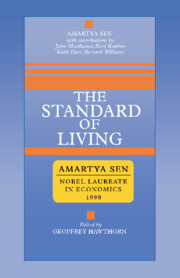Book contents
- Frontmatter
- Contents
- List of contributors
- Introduction
- The Standard of Living: Lecture I, Concepts and Critiques
- The Standard of Living: Lecture II, Lives and Capabilities
- Professor Sen on the Standard of Living
- The Standard of Living: Uncertainty, Inequality and Opportunity
- Commoditisation and the Standard of Living
- The Standard of Living: Interests and Capabilities
- Reply
- Bibliography
- Index
Commoditisation and the Standard of Living
Published online by Cambridge University Press: 23 December 2009
- Frontmatter
- Contents
- List of contributors
- Introduction
- The Standard of Living: Lecture I, Concepts and Critiques
- The Standard of Living: Lecture II, Lives and Capabilities
- Professor Sen on the Standard of Living
- The Standard of Living: Uncertainty, Inequality and Opportunity
- Commoditisation and the Standard of Living
- The Standard of Living: Interests and Capabilities
- Reply
- Bibliography
- Index
Summary
INTRODUCTION
The substantive question I address is how living standards are affected by the rise of industrial or commercial society, a phenomenon I summarise in the ugly neologism ‘commoditisation’ (Hart 1982b). If we want to understand the evolution of commodity economy, we also have to be able to talk about what it is not. Everywhere people do some things for themselves (self-provisioning) and sell their goods or labour (commodities). Modern economy is thus an uneven process of commoditisation, where large shifts in the balance between commodity and non-commodity production are normal. This is not an absolute contrast between subsistence and the market, since all families in the world at present combine specialised acts of sale and purchase with the performance of relatively undifferentiated work in domestic units of consumption. Rather, it would be more appropriate to speak of shifts in emphasis towards greater or lesser reliance on the market.
The standard of living is more easily conceptualised as a quantity when commodity production is seen to predominate in economic life. The early history of economic analysis rested on perceiving the scientific possibilities inherent in measuring the value of commodities; and much the same is true of economic orthodoxy today. The value of unpaid labour is more difficult to measure than that of commodities; and the standard of living is always made up of both, even if we restrict ourselves to the narrowest definition of its content.
- Type
- Chapter
- Information
- Tanner Lectures in Human ValuesThe Standard of Living, pp. 70 - 93Publisher: Cambridge University PressPrint publication year: 1987
- 2
- Cited by



